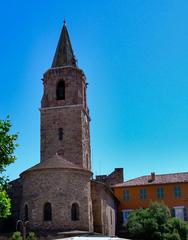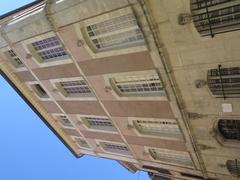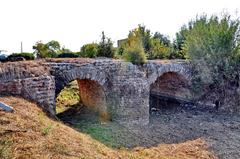
Forum Iulii: Visiting Hours, Tickets, and Historical Sites in Fréjus, France
Date: 04/07/2025
Introduction: Forum Iulii and Its Historical and Cultural Significance
Located on the scenic Mediterranean coast of southeastern France, the city of Fréjus—originally known as Forum Iulii—offers a captivating blend of Roman history, medieval architecture, and vibrant Provençal culture. Founded between 31 and 27 BCE by Julius Caesar and later developed by Augustus, Forum Iulii was a crucial Roman naval and commercial hub, serving to secure the Mediterranean coastline of Gaul. Its establishment as a veteran colony and military port marked it as a significant site during the Roman Republic’s final years (frejus.fr, romanports.org).
Today, Fréjus preserves an extraordinary array of Roman and medieval monuments, including its renowned amphitheatre, aqueduct, city fortifications, and the Cathedral of Saint-Léonce. The city’s multifaceted history is brought to life through guided tours, cultural festivals, and immersive exhibits, making Fréjus a must-visit for history enthusiasts and cultural travelers (frejus-tourist-office.com).
Table of Contents
- Roman Origins and Foundation
- Role as a Roman Naval and Commercial Hub
- Transition to a Christian Stronghold
- Medieval and Early Modern Developments
- Modern Era: Resilience and Revival
- Visiting Fréjus: Hours, Tickets, and Tours
- Accessibility and Travel Tips
- Nearby Attractions
- Frequently Asked Questions (FAQ)
- Cultural and Historical Significance
- Key Monuments and Sites
- Exploring Fréjus: Roman & Medieval Heritage
- Cultural Events and Local Traditions
- Practical Visitor Information
- Accommodation, Dining, and Local Cuisine
- Events, Safety, and Sustainable Tourism
- Tips for a Memorable Visit
- Useful Contacts and Additional Resources
Roman Origins and Foundation
Forum Iulii was established under Julius Caesar’s directive and further developed by Augustus. Its name directly references the Julian lineage and its role as an imperial project. The city was intended as a settlement for retired Roman soldiers and functioned as a vital naval base, especially during the tumultuous late Republic (frejus.fr, romanports.org). The strategic construction of its port and city infrastructure underpinned its military and economic significance.
Role as a Roman Naval and Commercial Hub
Forum Iulii quickly became a preeminent western Mediterranean port. Its robust stone harbor was designed for longevity, unlike many temporary Roman military ports. The city thrived during the Second Triumvirate, supporting naval campaigns and acting as a logistical hub for Roman legions in Gaul. Architectural highlights from this era include the amphitheatre, aqueduct, and vivier (fishpond), which remain as evidence of the city’s prosperity (frejus.fr). However, by the end of the first century CE, silting diminished the port’s navigability and led to a gradual decline in its military importance (romanports.org).
Transition to a Christian Stronghold
As the Roman Empire declined, so too did Forum Iulii’s military centrality. The city became a prominent Christian bishopric under Saint-Léonce, with the construction of the cathedral and bishop’s palace marking a new religious era. Despite invasions and plagues, Fréjus’s fortified walls and ecclesiastical leadership ensured its survival and recovery (frejus.fr).
Medieval and Early Modern Developments
During the Middle Ages, Fréjus maintained its significance as an episcopal seat and regional stronghold. The urban landscape evolved, with Roman structures giving way to defensive walls, fortified churches, and new civic buildings. The Renaissance and modern periods brought further transformation, notably with Napoleon’s landing in 1799 and the city’s later role as a garrison town (frejus.fr).
Modern Era: Resilience and Revival
The 20th century brought both catastrophe and renewal: the Malpasset Dam disaster in 1959 devastated the city, but the community’s determined rebuilding led to a vibrant seaside resort and cultural center. Today, Fréjus harmoniously blends ancient monuments, medieval quarters, and modern amenities, offering a unique historical tapestry (frejus.fr).
Visiting Fréjus: Hours, Tickets, and Tours
Fréjus’s top historical sites are accessible year-round:
- April to September: 9:30 AM – 7:00 PM
- October to March: 10:00 AM – 5:00 PM
Ticket prices generally range from €5 to €10 for adults, with discounts for children, seniors, and groups. Combined tickets and guided tours—bookable at the tourist office—offer additional value and insight.
Accessibility and Travel Tips
Fréjus is easily reached by train, car, or bus from major cities like Nice and Marseille. Most key sites are adapted for wheelchair access, though the historic center features cobblestone streets. Comfortable walking shoes and water are recommended, especially in summer.
Nearby Attractions
Enhance your visit by exploring the Massif de l’Esterel for hiking, the beaches of the Côte d’Azur, or the neighboring town of Saint-Raphaël, renowned for its own Roman heritage.
Frequently Asked Questions (FAQ)
Q: What are the main historical sites in Fréjus?
A: The Amphitheatre, Roman Aqueduct, Vivier Romain, Cathedral of Saint-Léonce, medieval cloister, and fortifications.
Q: Where can I buy tickets?
A: At each site entrance or via the tourist office website.
Q: Are guided tours available?
A: Yes, in multiple languages through the tourist office.
Q: What are the visiting hours?
A: Generally 9:30 AM–7:00 PM (summer) and 10:00 AM–5:00 PM (winter); check specific sites for updates.
Q: Is Fréjus family-friendly?
A: Absolutely—many sites and events are suitable for visitors of all ages.
Cultural and Historical Significance
Forum Iulii/Fréjus exemplifies Mediterranean resilience and cultural adaptation. Its monuments, including the amphitheatre and cathedral, serve as living venues for festivals and performances, bridging ancient and contemporary cultures (frejus.fr). Annual events like “Les Nuits Auréliennes” and the “Fête du Raisin” celebrate both Roman origins and Provençal customs (frejus.fr).
Key Monuments and Sites
- Amphitheatre: Seats up to 12,000; hosts modern events (frejus.fr).
- Roman Aqueduct: Once spanned 40 km, supplying ancient Fréjus.
- Vivier Romain: Remnants of Roman fishponds.
- Cathedral of Saint-Léonce: Blends Roman and medieval architecture.
- Cloister and Medieval Walls: Defensive and religious significance.
- Belle-Époque Villas: Reflect modern evolution.
Audioguides and guided circuits are available at the tourist office.
Exploring Fréjus: Roman & Medieval Heritage
Roman Heritage Sites
- Amphitheatre: 296 rue Vadon. Open daily, €6 adults, €3 reduced, free under 18 (official tourism). Guided tours and events available (ville-frejus.fr, p.4).
- Roman Theatre: 175 avenue du Théâtre romain. Free entry, open sunrise to sunset.
- Aqueduct: Outdoor site, accessible year-round, guided tours available seasonally.
- Fishpond (Vivier Romain): Special guided tours by reservation.
- City Gates and Fortifications: Porte des Gaules, Porte d’Orée, and visible ramparts.
- Archaeological Museum: 32 place Calvini. €5 adults, €3 reduced, free under 18.
- Other Monuments: Lanterne d’Auguste, Arches Sénéquier/Bérenguier, Butte Saint-Antoine.
Medieval Heritage Sites
- Cathedral of Saint-Léonce: 5th–13th centuries. Free entry, 9:00 AM–12:00 PM & 2:00–6:00 PM.
- Cloister: Painted ceilings, open during cathedral hours.
- Chapelle Notre-Dame-de-Jérusalem: DN7 route de Cannes. €4 adults, free under 12.
- Musée d’Histoire Locale: 153 rue Jean Jaurès, €3 adults, free under 18.
- Events: Year-round cultural programming, guided tours, and heritage lectures (ville-frejus.fr, p.1).
Cultural Events and Local Traditions
Annual Festivals
- Spring: Nature and heritage celebrations, Bravado festival, Pitchoun Festival (Varactu).
- Summer: Aurélian Nights theatre, Summer Vibes, Zamna Festival, Fête de la Musique (AllEvents.in), Night Markets (Living on the Côte d’Azur).
- Autumn: Roc d’Azur biking event, Grape Festival.
- Winter: Sacred Music Festival, Happy Christmas, Saint-Pons Day.
Provençal Customs
- Markets: Wednesday and Saturday markets, summer Night Markets.
- Gastronomy: Socca, AOC Fréjus wines, seafood, local specialties.
- Religious and Communal Celebrations: Bravado processions, Giant Omelette event.
- Artistic Heritage: Amphitheatre and theatre host modern cultural events.
Practical Visitor Information
- Tourist Office: Le Florus II, 249 rue Jean Jaurès (frejus.fr)
- Accessibility: Most sites are partially accessible; check details in advance.
- Best Time to Visit: Spring and early autumn for ideal weather.
- Transportation: Ample parking, public buses, and pedestrian-friendly historic center.
Accommodation, Dining, and Local Cuisine
Fréjus offers accommodations from luxury hotels to family-friendly resorts. The old town and port areas are ideal for dining on Provençal and Mediterranean specialties like bouillabaisse and ratatouille, accompanied by local wines. Local markets are perfect for sampling regional produce (Overyourplace).
Events, Safety, and Sustainable Tourism
Major festivals, such as the Madame Loyal Festival, attract visitors in summer. Fréjus is a safe destination with a focus on eco-friendly tourism—support local artisans, use public transport, and respect historical sites.
Tips for a Memorable Visit
- Visit major sites early to avoid crowds.
- Pair sightseeing with beach or mountain excursions.
- Stay hydrated and wear comfortable shoes.
- Greet locals with “Bonjour” and be respectful at religious sites.
- Make use of virtual tours and interactive resources (Fréjus Tourist Office).
Useful Contacts and Additional Resources
- Tourist Office: +33 4 94 51 83 83 (website)
- Emergency Services: 112
- Taxi Service: Available at train station and throughout town
Consult the official Fréjus Tourist Office website for up-to-date information, guided tour bookings, and multilingual resources.
Summary and Encouragement
Fréjus stands as a remarkable destination where Roman grandeur and medieval resilience meet vibrant Mediterranean culture. From the amphitheatre and aqueduct to the Cathedral of Saint-Léonce and lively Provençal markets, Fréjus offers an immersive journey through history and tradition (frejus.fr, frejus-tourist-office.com). Plan your visit with confidence, make use of guided tours and the Audiala app, and embrace all that this exceptional city has to offer.
References
- Exploring Fréjus: Visiting Hours, Tickets, and Historical Sites of the Roman City Forum Iulii, 2025, Fréjus Official Site (frejus.fr)
- Roman Military Ports and Naval Bases, 2025, Roman Ports Project (romanports.org)
- Exploring Fréjus Historical Sites: Visiting Hours, Tickets, and Roman & Medieval Heritage, 2025, Fréjus Tourist Office (frejus-tourist-office.com)
- Cultural Events and Local Traditions in Fréjus: Visiting Hours, Tickets, and Historical Sites Guide, 2025, Fréjus Tourist Office (frejus-tourist-office.com/agenda/les-grands-evenements/)
- Visitor Information and Practical Tips, 2025, Happy Little Traveler (happylittletraveler.com)
- Visitor Information and Practical Tips, 2025, France-Voyage (france-voyage.com)





